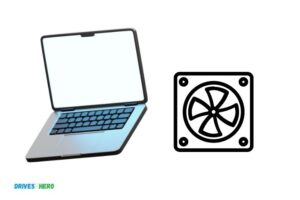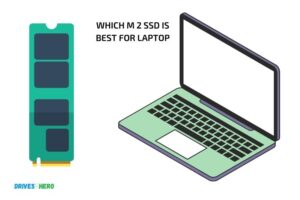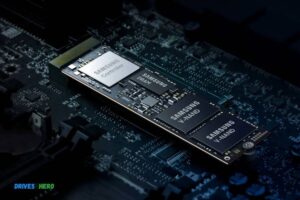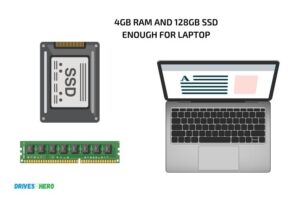Ssd Vs Hdd Old Laptop: Which One Best For You!
When deciding between an SSD (Solid State Drive) or HDD (Hard Disk Drive) for an old laptop, it is typically better to choose an SSD.
SSDs are faster, more durable, and consume less power than HDDs.
Solid State Drives use flash memory to store data, which provides a faster and more reliable performance compared to Hard Disk Drives.
HDDs use mechanical parts that can fail over time, especially in laptops that are moved around frequently. SSDs are also more energy efficient, leading to longer battery life in laptops.
For an old laptop, upgrading to an SSD can greatly enhance its performance, lifespan, and efficiency. It can breathe new life into the system, making boot times faster and operations smoother.
Despite SSDs being more expensive, the benefits they provide, especially in terms of speed and durability, make them a worthy investment for an old laptop.
Features Comparison Of SSD Vs HDD For Old Laptop
| Features | SSD | HDD |
|---|---|---|
| Speed | Much faster than HDDs | Slower than SSDs |
| Durability | No moving parts, less likely to get damaged | Moving parts, more prone to physical damage |
| Noise | Silent | Can produce noise from the disk spin |
| Heat Production | Produces less heat | Produces more heat |
| Price | More expensive | Cheaper |
| Capacity | Usually, less capacity than HDDs | Larger storage capacities |
| Energy Efficiency | More energy efficient | Less energy efficient |
| Lifespan | Longer life expectancy, depending on usage | Shorter lifespan, depending on usage |
| Boot Time | Faster system boot-up | Slower system boot-up |
| Data Access | Faster data access | Slower data access |
| Effect on Laptop Performance | Improves overall laptop performance | Can limit laptop performance due to its speed |
Key Takeaway
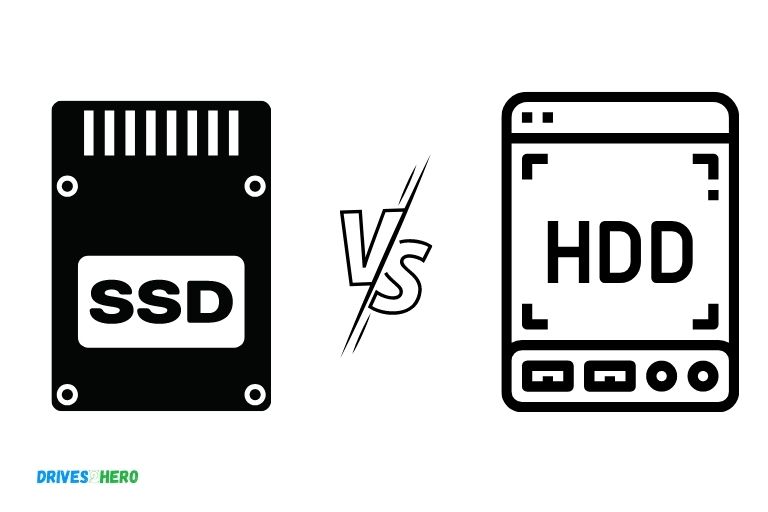
Five Facts About Ssd Vs Hdd Old Laptop
Understanding The Differences Between Ssd And Hdd For An Old Laptop
Ssd vs hdd old laptop: understanding the differences between ssd and hdd for an old laptop
Older laptops come equipped with hdds, or hard disk drives, as their primary storage solution. However, in recent years, ssds, or solid-state drives, have become a popular alternative to HDDs.
So, which technology is better for an old laptop? In this section, we explore the key differences between ssds and hdds and help you understand which option is better suited for your old laptop.
Definition Of Ssd And Hdd
Solid-State Drive (Ssd)
- Stores data on a non-volatile flash memory.
- The lack of moving parts makes it more reliable and faster.
- A more expensive option than hdd and has a shorter lifespan.
Hard Disk Drive (Hdd)
- Stores data on spinning magnetic disks.
- A cheaper option that offers more storage space.
- The moving parts make it more prone to mechanical failure.
Understanding The Technical Differences Between Ssds And Hdds
When it comes to storage technology, ssds and hdds have several technical differences. Here are some of the significant differences between the two:
Speed
- Ssds are considerably faster than hdds in terms of read and write speeds.
- Ssds have a higher data transfer rate compared to hdds.
Durability
- The lack of moving parts makes ssds more durable than hdds.
- Hdds are more prone to physical damage and wear and tear, which can cause loss of data.
Power Consumption
- Hdds consume more power than ssds because of the moving parts.
Cost
- Ssds are more expensive than hdds, and you’ll get less storage for your money.
Which Technology Is Better For An Old Laptop?
While ssds are faster, more durable and use less power than hdds, they do come at a premium cost. Hence, if you’re looking to replace the hard drive of your old laptop, and you’re on a budget, hdds can provide you with more storage for a lesser price.
On the other hand, suppose you want a more reliable and faster drive, and you don’t require a lot of storage space. An ssd is an ideal choice, and the investment will be worth it.
Both technologies have their advantages and disadvantages, and the choice entirely depends on your preferences.
Ultimately, a solid-state drive provides better performance, while an hdd is an economical choice with better storage capacities for an old laptop.
Benefits Of Upgrading From Hdd To Ssd In An Old Laptop
Upgrading from an hdd to an ssd in an old laptop is always a good idea. The old spinning-disk hard disk drive (hdd) technology has now become outdated.
Solid state drives (ssd), on the other hand, are more advanced and provide better performance, durability, speed, and efficiency.
Here are some of the benefits of upgrading from hdd to ssd in an old laptop, which will help you understand why it is worth investing in an ssd for an old computer.
Improved Speed And Performance
An ssd is much faster than an hdd. It takes significantly less time for an ssd to read and write data, which results in faster boot and load times.
This is particularly important in old laptops, which tend to operate slowly due to outdated hardware and software.
Laptops that take minutes to boot can boot in seconds with an ssd upgrade.
Additionally, because ssds do not have any moving parts, they generate fewer vibrations and noises, enabling them to operate more smoothly and quietly. Moreover, the low power consumption of the ssd translates into an improvement in battery life.
Better Durability, Reliability, And Power Efficiency
An hdd is fragile and susceptible to damage if dropped or bumped. Because the device contains spinning disks, a sudden motion can lead to data loss or physical damage to the drive.
Ssds are different since they are made up of microchips and have no moving parts, rendering them more durable in the face of more robust daily use.
Ssds are also more efficient and consume less power than conventional hdds. With no rotating platter to power, an ssd consumes less power, generating less heat and prolonging battery life, ensuring a longer lifespan for your laptop.
Enhanced User Experience
Beyond the speed improvements, the ssd’s durability translates into a better user experience. Because an ssd can read and write data more quickly, users can effortlessly multitask without any noticeable lag or delay.
This ensures that the laptop is always running smoothly, regardless of the number of programs open, documents pending, or webpages being browsed.
Fewer delays mean fewer wasted seconds, resulting in increased productivity. Switching to an ssd can provide an entirely fresh desktop experience, even on an old laptop.
Affordable Cost
In the past, ssds were considerably more expensive than hdds. However, as technology has progressed, ssd prices have fallen, making them more accessible to the everyday user.
In comparison with the instant results, an ssd upgrade provides, the cost of upgrading an old laptop’s hard drive to an ssd is relatively small.
Upgrading from an hdd to an ssd in an old laptop brings many benefits, including improved speed and performance, power efficiency, better reliability and durability, and, most importantly, an enhanced user experience.
The financial cost of this upgrade is minimal, and when compared to the vast improvements in performance, it is an investment that is undoubtedly worth making.
How To Upgrade Your Old Laptop From Hdd To Ssd
Ssd Vs Hdd Old Laptop: How To Upgrade Your Old Laptop From Hdd To Ssd
Upgrading your old laptop from hdd to ssd can increase your system’s speed, performance, and durability.
Before upgrading, there are various considerations you need to know to make your upgrade process safer, faster, and easier. This guide will discuss how to upgrade your old laptop from hdd to ssd step by step.
Backing Up Your Critical Files
Before upgrading your old laptop from hdd to ssd, it is important to back up all your important files to prevent data loss. You can use an external hard drive to create a backup of your files.
Here are the steps you can follow to create a backup of your data:
- Connect your external hard drive to your laptop
- Open the file explorer
- Select the files or folders you want to backup
- Copy and paste them into your external hard drive
Choosing The Right Ssd For Your Old Laptop
Not all ssds are compatible with your old laptop. You have to check your laptop’s specifications and requirements to ensure that the chosen ssd is suitable.
Here are some factors to consider when choosing the right ssd for your old laptop:
- Storage capacity: Choose an ssd with a sufficient storage capacity that can accommodate your files.
- Form factor: Ssds come in various sizes. Check the form factor of your old laptop to ensure compatibility with the ssd you choose.
- Speed: Different ssds have varying speeds. Choose an ssd that can offer faster read/write speeds to enhance your system’s performance.
- Budget: Ssds are available at different prices. Choose an ssd that is within your budget.
Transferring Your Data To Ssd
After selecting the ssd, it’s time to transfer your data to the new hard drive. There are various ways you can transfer your data to the new ssd. You can either use cloning software or manually transfer your data.
Here are the steps for both methods:
Cloning Software:
- Download and install cloning software on your old laptop
- Connect your new ssd to your laptop
- Launch the cloning software and follow the on-screen instructions
- The software will copy everything from your old hard drive to the new ssd
Manual Transfer:
- Connect your new ssd to your laptop
- Open the file explorer
- Copy the files or folders you want to transfer from your old hard drive
- Paste them into your new ssd
Installing The New Ssd
After transferring your data to the new ssd, it’s time to install the drive into your old laptop.
Here are the steps you can follow to install the new ssd:
- Turn off your laptop
- Remove the access panel to the old hard drive
- Remove the old hard drive and replace it with the new ssd
- Close the access panel
- Turn on your laptop
Congratulations! You have now successfully upgraded your old laptop from hdd to ssd. Enjoy your laptop’s faster speed and performance.
Important Considerations Before Upgrading Your Old Laptop To Ssd
Upgrading an old laptop by replacing its hard disk drive (hdd) with a solid state drive (ssd) is an excellent way to boost its speed and performance.
However, before upgrading, there are several important considerations to keep in mind.
We’ll discuss the compatibility of your old laptop with an ssd, ssd capacity, budget considerations, technical expertise, and potential risks and drawbacks of upgrading.
Compatibility With Your Old Laptop
Before upgrading your old laptop to an ssd, you need to ensure that your laptop is compatible with an SSD.
Here are some important compatibility considerations to keep in mind:
- Check whether your laptop has a sata or pcie interface, as ssds are available in both variants.
- Check the form factor of your laptop’s hdd to ensure that the ssd you choose has the same form factor.
- Check the dimensions of the ssd to make sure it fits into your laptop’s compartment.
Ssd Capacity
The capacity of an ssd is a critical factor to consider before upgrading your laptop. Ssds are available in various capacities ranging from 64gb to 4tb.
Consider the following when choosing the capacity of an ssd:
- Assess your data storage requirements and select a capacity that suits your needs.
- Allow some extra space for future data storage requirements.
- Factor in the cost difference between different capacities and consider what you’re willing to spend.
Budget Considerations
Upgrading an old laptop can be an expensive affair.
Here are some budget considerations to keep in mind:
- Compare prices of different ssds available in the market.
- Consider the cost of other accessories which you may need during the installation process.
- Consider the overall cost of upgrading, including any labor costs, if you plan on getting professional help.
Technical Expertise
Installing an ssd in an old laptop requires some technical expertise.
Consider the following:
- Decide whether you have the technical knowledge to install an ssd yourself or hire a professional for assistance.
- Research the installation process and procedures before attempting it yourself.
- Ensure you have all the required tools for the installation process.
Potential Risks And Drawbacks
There are some risks and drawbacks associated with upgrading an old laptop to an SSD.
These include:
- Risk of data loss during the installation process.
- The need to clone and transfer data from the old hdd to the new ssd.
- Compatibility issues that could result in your laptop not functioning properly.
- The potential for reduced lifespan of an ssd, which can result in unexpected data loss.
Upgrading your old laptop to an ssd is a fantastic way to improve its performance.
However, before making the switch, ensure compatibility with your laptop, select an appropriate capacity, consider the associated costs, evaluate your technical expertise, and be aware of the potential risks and drawbacks.
FAQ On Ssd Vs Hdd Old Laptop
Are There Any Downsides To Upgrading To An Ssd?
One potential downside is that ssds are generally more expensive than hdds. Additionally, ssds are typically capable of storing less data than hdds.
Can I Upgrade An Old Laptop To An Ssd?
In many cases, yes. Check your laptop’s specifications to ensure compatibility and consider consulting a professional.
What Are The Benefits Of Upgrading To An Ssd?
Upgrading to an ssd can result in faster boot times, faster file loading, and improved overall performance.
How Does An Ssd Differ From An Hdd?
An ssd relies on flash memory to store data, while an hdd uses spinning disks.
Conclusion
Upgrading your old laptop from a traditional hard drive (hdd) to a solid state drive (ssd) can bring significant improvements in terms of speed, performance, and reliability. With faster boot-up and file transfer times, you can save valuable minutes in your daily routine.
Additionally, ssds have no moving parts, making them less prone to physical damage and data loss. However, keep in mind that ssds are still more expensive than hdds, so you will need to weigh the cost against the benefits.
Overall, if you want to extend the life of your old laptop and give it a boost, upgrading to an ssd can be a worthwhile investment.
With the right knowledge and a little bit of research, you can make an informed decision on whether an ssd is right for you and your laptop.

